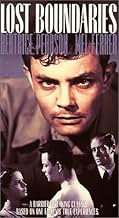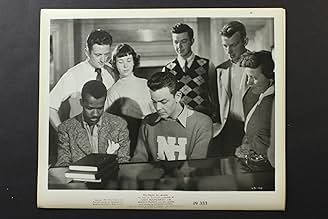CALIFICACIÓN DE IMDb
7.0/10
607
TU CALIFICACIÓN
Agrega una trama en tu idiomaA fair-skinned African American doctor faces discrimination in 1940s America. Unable to find work as himself, he reluctantly "passes" as white, building a successful life in New Hampshire un... Leer todoA fair-skinned African American doctor faces discrimination in 1940s America. Unable to find work as himself, he reluctantly "passes" as white, building a successful life in New Hampshire until WWII exposes his heritage.A fair-skinned African American doctor faces discrimination in 1940s America. Unable to find work as himself, he reluctantly "passes" as white, building a successful life in New Hampshire until WWII exposes his heritage.
- Dirección
- Guionistas
- Elenco
- Premios
- 4 premios ganados y 4 nominaciones en total
Susan Douglas Rubes
- Shelly Carter
- (as Susan Douglas)
Robert A. Dunn
- Rev. John Taylor
- (as Rev. Robert A. Dunn)
Rai Sanders
- Dr. Jesse Pridham
- (as Rai Saunders)
Opiniones destacadas
Lost Boundaries I felt was a really good film. Never would have even thought of something like it. The family had such good hearts and were caring and loving people who got along with everyone they met pretty much. No body knew they were actually African American though. If people had known they would not have had the life they lived for such a long time. He wanted to tell people. He did not want to have to keep his race a secret just so he would be treated differently. Its sad to think that people were really like that. This movie has a great ending however. You think for a little while that once their secret was revealed that they were going to be shunned by everyone. They were at first too except for the daughter with her boyfriend. He never let it bother him. She was more ashamed of it than he was which is also very sad. Those kids grew up just like all the other white kids thinking that being a Negro was a terrible thing and even though the son was kind to them and one of his best friends was Negro he was not pleased and was disgusted when he found out he was actually African American himself just very light skinned. But the town comes around when in church the preacher preaches about how that is not how God would do things. God loves everyone and treats everyone equally and it was at the end of the service that people let go of the grudge they had against different colors. They also kept him as their town doctor. I saw many things in this film that I would be appalled to see actually happen to day but that doesn't change the fact that that is how the times were then and just how people acted.
Lost Boundaries (1949)
This affected me more than I would have expected. I mean, the changes in how we see race and "race relations" since 1949 are huge. The acting is really solid, if not searingly intense (which it has room for). And the narrative is complex enough with a few turning points to make it all interesting.
There is a sense as you watch that you're being shown a social issue and that the jury is already in. We know what we are supposed to feel, and we feel it. There is also a sense of something that doesn't happen much any more—the well known trick of "passing," which means being an African-American (usually) who is light skinned enough to "pass" as white. This is no small thing, since it required a social shift and truly living a "white" American's life, including both the advantages and the inner angst of having left behind your own roots.
So it's important stuff, and good stuff. And it was more compelling in its details and acting than you might think, being both socially loaded and a bit low budget. The production standards are high, however, and the results make it worth watching. I frankly did more than confirm what I already knew about the era and race in America. I realigned a little, feeling more than reminded, but also a little educated.
Yes, the approach here is outdated, and it ignores the true range of racism and hatred of the time, even in the supposedly enlightened New England setting here. But it has the truth woven into the stylized telling. If you think you already know all this, give it a look anyway. It's imprtant enough to try.
This affected me more than I would have expected. I mean, the changes in how we see race and "race relations" since 1949 are huge. The acting is really solid, if not searingly intense (which it has room for). And the narrative is complex enough with a few turning points to make it all interesting.
There is a sense as you watch that you're being shown a social issue and that the jury is already in. We know what we are supposed to feel, and we feel it. There is also a sense of something that doesn't happen much any more—the well known trick of "passing," which means being an African-American (usually) who is light skinned enough to "pass" as white. This is no small thing, since it required a social shift and truly living a "white" American's life, including both the advantages and the inner angst of having left behind your own roots.
So it's important stuff, and good stuff. And it was more compelling in its details and acting than you might think, being both socially loaded and a bit low budget. The production standards are high, however, and the results make it worth watching. I frankly did more than confirm what I already knew about the era and race in America. I realigned a little, feeling more than reminded, but also a little educated.
Yes, the approach here is outdated, and it ignores the true range of racism and hatred of the time, even in the supposedly enlightened New England setting here. But it has the truth woven into the stylized telling. If you think you already know all this, give it a look anyway. It's imprtant enough to try.
Others have described Lost Boundaries very well here, so we will not retrace the plot. As we watched this movie on TCM, it again reinforced our feeling that the movie industry has in some ways lost its way today. From what we can see, while Lost Boundaries was well reviewed by contemporary viewers, it was not particularly recognized when it was made. Nevertheless, being a modest production of its time, it easily surpasses so many movies made today with far greater resources in terms of budget, "star power," and other means. When the industry focused on telling human stories with human beings, it was much more convincing. Today, there is so much focus on marketing, gimmickry, "star" power, and extraneous things like special effects and post-production polishing that it seems the stories lack that "human touch."
We live in Hawaii, and recently saw "The Descendants" out of natural curiosity to see our home state featured, and our response, and that of others we know, was lukewarm. The story seemed to lack depth and any real investment of characters to any stakes (since it was in part about land and wealth), yet it is being touted for Best Picture and more. Clooney was already given Best Actor in the Golden Globes, and our belief is that the award is being rigged because he is a Hollywood favorite and insider. It is a typical Clooney job...glib and slightly sarcastic, and it baffles us that it merits any such recognition.
Occasionally someone makes a great picture because talent is irrepressible and will always emerge, but now it seems to be in spite of the industry rather than because of it. It seems that the television producers seem to have passed the feature film producers in telling stories (Mad Men, Breaking Bad). Tell stories with people, about people, by people...please.
We live in Hawaii, and recently saw "The Descendants" out of natural curiosity to see our home state featured, and our response, and that of others we know, was lukewarm. The story seemed to lack depth and any real investment of characters to any stakes (since it was in part about land and wealth), yet it is being touted for Best Picture and more. Clooney was already given Best Actor in the Golden Globes, and our belief is that the award is being rigged because he is a Hollywood favorite and insider. It is a typical Clooney job...glib and slightly sarcastic, and it baffles us that it merits any such recognition.
Occasionally someone makes a great picture because talent is irrepressible and will always emerge, but now it seems to be in spite of the industry rather than because of it. It seems that the television producers seem to have passed the feature film producers in telling stories (Mad Men, Breaking Bad). Tell stories with people, about people, by people...please.
The topic of racial boundaries is explored in fine detail in this story about a light-skinned doctor and his family who all pass for white in a New England town. All points of view and opinions are represented. What makes this such a remarkable film is that it was made in 1949, hardly a year of profound social change in America when it came to the color line. This makes the movie that much more daring. A much better look at the topic of passing than either Pinkie or the second version of Imitation of Life (the first was quite extraordinary, and far superior). There are some really wonderful scenes including one at the town dance when the doctor's son brings home a dark-skinned black friend. The levels of acceptance and non-acceptance of the young black man are nuanced and played out beautifully.
The film suffers a tiny bit from hokey dialogue and mild melodrama, but that is more a result of the year it was made.
The film suffers a tiny bit from hokey dialogue and mild melodrama, but that is more a result of the year it was made.
The production of this film is so so. Nothing to brag about. But the subject content and the way it was approached, at least for the time that it was produced and shown, this was a groundbreaking film. No wonder it was banned from many movie theatres in the South and in the north, simply because it speak truth to power and it humanized black people. Once you're able to humanize something or to empathize with it, you're less likely to abhor or hate it. That's why this movie is so great, and it's why it got so much flak from White America for portraying such truth.
¿Sabías que…?
- TriviaBased on the lives of Albert and Thyra Johnston, who lived in New Hampshire in the 1930s and '40s.
- ErroresWhen the townsfolk are "whispering" among themselves about the Carters being "colored", their lip movement doesn't match what's being said.
- ConexionesFeatured in Classified X (2007)
Selecciones populares
Inicia sesión para calificar y agrega a la lista de videos para obtener recomendaciones personalizadas
Detalles
- Fecha de lanzamiento
- País de origen
- Idioma
- También se conoce como
- Lost Boundaries
- Locaciones de filmación
- Barrington, New Hampshire, Estados Unidos(Calef's Country Store)
- Productoras
- Ver más créditos de la compañía en IMDbPro
Taquilla
- Presupuesto
- USD 250,000 (estimado)
- Tiempo de ejecución
- 1h 39min(99 min)
- Color
- Relación de aspecto
- 1.37 : 1
Contribuir a esta página
Sugiere una edición o agrega el contenido que falta






























